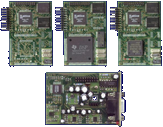Manufacturer “Kato Development”
7 expansions in database
Manufacturer Kato Development, Germany | Amiga CDTV | Interface 68000 socket |
- clock port interface
- provides an A1200 compatible clockport connector for the CDTV
- connects into the 68000 socket
Manufacturer Kato Development, Germany | Amiga A2000, A3000, A4000 | Interface Zorro II | Autoconfig ID 2145 / 128 |
- Texas Instruments TMS320AV110PBM
- MPEG layer I / II decoding in realtime
- fixed sample rate and resolution, 16 bit 44.1kHz output
- 128 kB FIFO buffer for internal CRC checking - error protection avoids noise
- 16 bit audio playback for replacing Paula - native AHI support
- Paula passthrough - simple analog mixing with Melody output
- Toccata emulation
- expansion bus for the sampler module with high speed serial port in development
- 2 audio in (for Paula passthrough), 2 audio out, all RCA
- AHI driver
- supported by NetBSD
- MelodyDriver.lha
Aminet
AHI driver
8 kB - melody.lha
Kato
install disk v2.13
76 kB
Manufacturer Kato Development, Germany | Date 1998 | Amiga A1200 | Interface clock port |
- recording and playback at 44.1 and 48 kHz, full duplex
- analog and host part is connected via ribbon cable which transports digital data only
- AHI driver
- analog part (same for all models)
- 20 bit Crystal AD/DA converter
- 108 dB signal to noise ratio
- 9 pin DSUB connector for plugging the adaptor with 6 RCA connectors
- two stereo line in connectors (RCA) - analog mixed and value controlled
- one internal input for CD-ROM audio
- one stereo output connector (RCA)
- passthrough and monitoring
- host part
- connects to clock port
- clock port passthrough for the optional RS232 module, Twister 1200
- 2 or 4 kB FIFO buffer to prevent interruption of playback and recording
- Melody 1200 Base
- 20 bit resolution
- 4 kB FIFO buffer
- Melody 1200 Plus
- 16 or 20 bit resolution
- 2 kB FIFO buffer
- 128 kB RAM for playback
- MPEG 1 audio layer I / II decoder DSP (Texas Instruments TMS320AV110PBM)
- Melody 1200 Pro
- 20 bit resolution
- 4 kB FIFO buffer
- MPEG 2.5 audio layer II / III decoder DSP
- optional Digital I/O module
- connects to the ribbon cable between the analog and host parts
- Crystal A-Lan controller for audio networking
- 24 bit input and output
- golden RCA and fibre connectors
- jobs like Analog-In to Digital-Out or Digital-In to Analog-Out are done without the computer incorporated
- mel1200_man.PDF
Kato Development
user manual (english)
181 kB
- melody.lha
Kato
install disk v2.13
76 kB
Manufacturer Kato Development, Germany | Date 1998 | Amiga A3000 | Interface special (see text) |
- allows using SIMMs instead of ZIPs
- the board covers the entire area of ZIP sockets and connects into some of them
- two 72 pin SIMM sockets accept 16 MB RAM
- supports 4 or 8 MB SIMMs, 80 ns or faster
- SIMM sizes can be mixed
- the SIMMs operate in page mode (static column ZIPs are up to 10% faster)
- separate version for the A3000T which has larger distance between the ZIP sockets
- SIMMfonieEng.PDF
Kato Development
user manual (english)
86 kB
Manufacturer Kato Development, Germany | Date 1998 | Amiga A1200 | Interface clock port |
- serial interface
- connects to the clock port
- ST16C650 serial interface chip
- 460800 bps transfer speed
- connects directly to the clock port or to the clock port passthrough of the Melody 1200 audio board
- FIFO based automatic flow control - the receiver is able to hold the transfer if the sender is too fast, no "hardware buffer overrun" messages
- twister_install.PDF
Kato Development
installation guide (english)
5 kB
- twister.lha
Kato
install disk v1.36
33 kB
Manufacturer Kato Development, Germany | Date 1999 | Amiga A1200 | Interface clock port |
- serial interface
- connects to the clock port
- a redesigned, cost reduced version of the original Twister 1200
- reduced interferences to other boards compared to the original Twister 1200
- ST16C650 serial interface chip
- 460800 bps guaranteed, 691200 bps typical transfer speed
- 32 byte send and 32 byte receive buffers
- compatible with the four clock ports of Power Computing's Z4 board
- compatible with the Melody 1200 audio board
- FIFO based automatic flow control - the receiver is able to hold the transfer if the sender is too fast, no "hardware buffer overrun" messages
- TwisterMK2Eng.PDF
Kato Development
installation guide (english)
19 kB - twister_rates.PDF
Kato Development
supported bitrates (english)
10 kB
- twister.lha
Kato
install disk v1.36
33 kB
Manufacturer Kato Development, Germany | Date 1999 | Amiga A2000, A3000, A4000 | Interface Zorro II |
- clock port and PCMCIA interface
- allows using expansions initially done for the A1200
- onboard high speed serial interface - the same as Twister 1200
- the card is prepared for an onboard parallel interface
- two clock ports, one PCMCIA port and one external serial port
- variable bus speed - it makes possible to run expansions nearly as slow as in the A1200 but it's even possible to go up to twice that speed
- optional PCMCIA Ethernet modules
- 10Base-T and 10Base-2 connectors
- 16 kB databuffer
- auto detection of TwistedPair / BNC connection
- 100Base-TX connector
- 64 kB databuffer
- auto negotiation of 10Base-T and 100Base-TX
- Unity-Net 10
- Unity-Net 100
- Notes
- the Unity never left prototype status
- standard version was too expensive
- the cost reduced version was easily destroyable due to lacking buffers
 Amiga Hardware Database
Amiga Hardware Database








